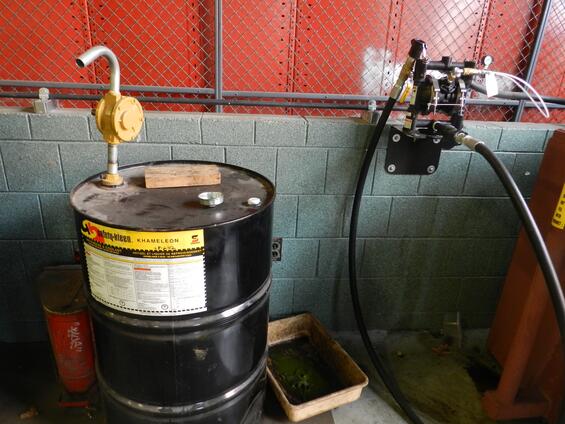Download this Fact Sheet as a PDF
Managing Used Antifreeze in Massachusetts
Antifreeze cannot legally be disposed of in solid waste landfills, discharged to the ground or into catch basins that lead to surface water, or discharged to a sewer connection without a permit to do so.
In Massachusetts, spent antifreeze is presumed to be non-hazardous when kept separate from other wastes before recycling or shipping. However, the generator is ultimately responsible for determining whether or not the antifreeze should be managed as hazardous waste. MassDEP certified laboratories can perform Toxicity Characteristic Leaching Procedure (TCLP) testing to determine this.
Storing and Labeling Used Antifreeze
Since used antifreeze is generally considered not to be a hazardous regulated recyclable material, no recycling permit or special labeling are required. To be considered properly labeled, the drum should simply have the words "used antifreeze," "waste antifreeze,” "antifreeze only," or similar wording that distinguishes antifreeze storage from waste oil storage. Antifreeze destined for recycling should not be kept in the hazardous waste or waste oil storage area. No manifest is required for shipping;instead a Bill of Lading should be used.
Offsite Recycling Services
Offsite recycling via the services of your shop’s waste pick-up company or a permitted waste recycler is an option for shops to recycle used antifreeze without purchasing an in-shop unit. To take advantage of this service, first talk to your waste-pick up company about your options. If antifreeze recycling is not a service that your pick-up company provides, MassDEP posts a list of the current permitted recycling companies in Massachusetts.
Even though recyclers are capable of providing a product that matches the purity of virgin antifreeze, shops are responsible for adhering to vehicle warranty requirements and must be proactive about researching the correct additive packages and obtaining evidence of testing from their recycler. Industry experts indicate that the best recyclers use ion exchange or fractional distillation (more widely-used and highly-regarded method). The ASTM standards that recyclers adhere to are:
- ASTM 3306 - Standard Specification for Glycol Base Engine Coolant for Automobile and Light-Duty Service
- ASTM 6210 - Standard Specification for Fully-Formulated Glycol Base Engine Coolant for Heavy-Duty Engines
Warranty and Liability Concerns for Recycled Antifreeze
Shops can become liable for damages or risk losing their customer’s vehicle warranty if the purity and effectiveness of the antifreeze does not meet American Society for Testing Material (ASTM) standards for purity. Some shops feel that this risk is too great to ever use recycled antifreeze, however many manufacturers allow for use of recycled coolant as long as it meets ASTM standards.

A designated barrel for used antifreeze.
Next Steps
- Talk with your supplier or hazardous waste management company for antifreeze recycling and management options.
- Contact maota@mass.gov for assistance.
Check Warranties
Make sure that using recycled antifreeze will not void vehicle warranties. Many car manufacturers allow for use of recycled antifreeze as long as the product complies with the ASTM standards.
Contact
Phone
You will be connected to the person who can best answer your questions.